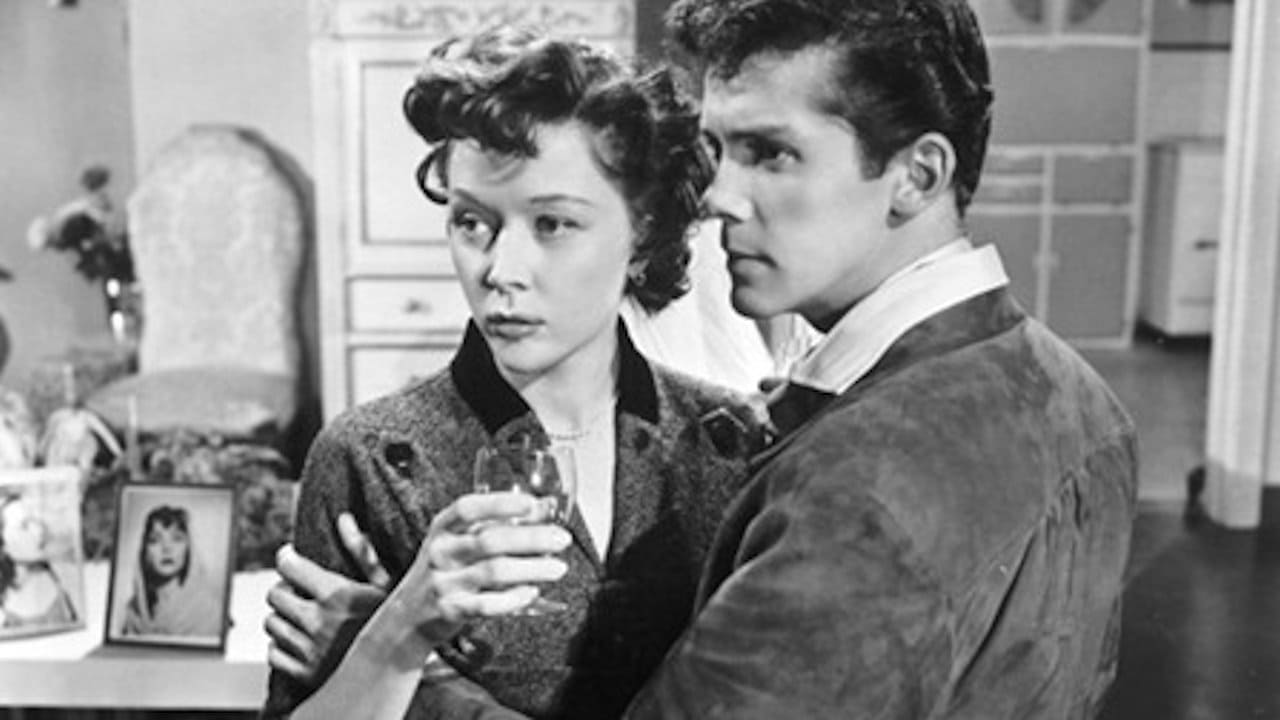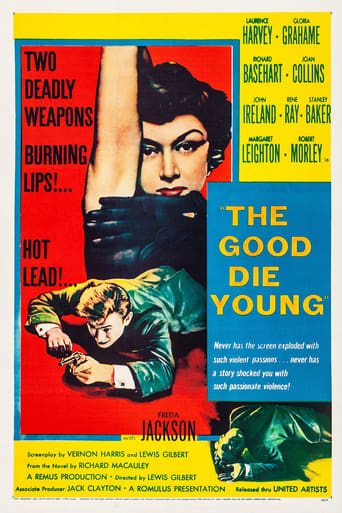



Really Surprised!
Brilliant and touching
After playing with our expectations, this turns out to be a very different sort of film.
View MoreA clunky actioner with a handful of cool moments.
THE GOOD DIE YOUNG is a fine British crime film noir of the 1950s with an impressive British/American cast and an intriguing storyline. The narrative is carefully structured, beginning with an exciting interlude before telling four separate character stories in flashback. Eventually the viewer catches up with the present for a gripping climax.The first thing you notice about this film is the exemplary cast. Laurence Harvey is perfectly cast as the despicable cad who gathers together a team of desperate men to pull of a post office robbery. Richard Basehart is the imported American player struggling to wrest control of his youthful wife Joan Collins from his sinister mother-in-law (Freda Jackson, who with this and THE BRIDES OF Dracula had a fine role in domineering older women). John Ireland and Gloria Grahame have a convincingly volatile relationship.Best of the bunch is a thoroughly sympathetic Stanley Baker playing a down-on-his-luck boxer going through some very tough times. The underrated Baker is a delight in the part and steals his scenes, even from Harvey. The likes of Robert Morley and Lee Patterson provide solid support. The lengthy flashback scenes are engaging pieces of character work, true to life and authentic, and they serve as a good set-up for the electrifying climax where things don't go according to plan. The last twenty minutes of this film are impressively downbeat and nail-biting to boot. Great stuff.
View MoreOne by one we meet four troubled men.(1) Richard Basehart is a clerk in New York who gives up his job and spends all his money flying to England to fetch his wife, Joan Collins, back home. Collins loves Basehart but is in thrall to her wicked Mum who hates Basehart and constantly comes down with phony, hypochondriacal illnesses to keep Collins with her. Basehart can't pry her away and, in any case, is now nearly broke.(2) Stanley Baker, a boxer who has had his brains beaten out for twelve years but has finally managed to save twelve hundred pounds, enough for him to quit the ring and buy a tobacconist's shop. His decision is made final when he must have his hand amputated. Alas, his stake disappears when it's used as bail for his no-good brother-in-law who promptly skips town and forfeits the bail.(3) John Ireland, a sergeant in the US Air Force, who is about to be transferred from England to Germany. His problem is that his wife, Gloria Grahame, is a narcissistic film star who is always followed around by a gaggle of horny groupies. He becomes a deserter in his efforts to renew their love.(4) Lawrence Harvey: Smooth, insincere husband to a rich woman who finally refuses to pay for any more of his indulgences, such as women and gambling. Like the others, he's a combat veteran. But his decorations in North Africa were unjustly won because he simply murdered a handful of German prisoners. This was especially déclassé because North Africa was a gentleman's war. Now his rich old wife is cutting him off.What to do, what to do? The answer is to organize a group of robbers -- himself and the other three, whom he has met adventitiously in a pub -- and steal ninety thousand pounds in old bank notes from a post office across the street from the pub. They will all have guns but if they do what they're supposed to, the guns will not be needed.I don't want to give too much away, but the four men pull the robbery off, but the duplicitous Harvey not only begins shooting police officers but Baker as well. During their getaway, Harvey sees to it that Ireland "accidentally" falls on the third rail of the underground railway. Basehart has seen none of this but suspects betrayal since, after all, he may be a mere unemployed clerk but is not a jackass. Nobody gets away. This is 1954. No miscreant ever got away clean in 1954. But the final scene, a confrontation between Harvey and Basehart, is not badly done. A lot of tension nicely captured. Other than that, the direction is routine.I had a problem with Harvey's hair. He doesn't have nice hair. It's long, thin, and stringy and if not properly maintained it tends to fall in greasy strands across his forehead. Here, makeup has created a coiffure that resembles some kind of 1950s pompadour or something. It juts up and out over his face. When he runs, this lump of hair bounces up and down as if held together by Crazy Glue. Other than that, he's an admirable rat, what with his sleek features and posh accent. Joan Collins hasn't that much screen time but she's gorgeous. She should leave her cheek bones, those flaring malars, to the British Museum. She's worth robbing a Post Office for. Gloria Grahame was a popular noir figure and for good reason. She has a tiny sexy mouth and a girlish whine. She always sounds dumb and wily at the same time. But her attempt at an English accent is a successful failure.
View More"The Good Die Young" is a slog of a movie with an excess of plot development and a lack of action. Much of it is told in flashback dealing with how the disparate group of robbers was assembled. They are Harvey, Basehart, Ireland and Baker. Never have more time and words been spent in establishing motive and circumstance than in this talk-a-thon of a picture.On the distaff side of the cast are Gloria Grahame (trampy wife), Joan Collins (stalwart wife), and Margaret Leighton(worldly older wife). All acquit themselves very well and acting on both sides may be the only reason to stick this one out. The story itself is not bad, it just takes too long to get underway and by that time one's patience has been severely tried.I had a slight problem with the artificial denouement. I found the coincidental meeting of principals too far-fetched and defying the element of time, but at that point I just wanted it to end.
View MoreTo understand the impact one particular quote from this movie had on me, you need to know that I first saw it at an 'Astra' cinema in the 1950s, while serving in the RAF.In a scene early on in the film, John Ireland, a sergeant in the USAF, is accusing his wife, played by Gloria Grahame, of infidelity. She turns to him with self-righteous indignation and says (as only she can) :"Eddie, your time in the Air Force has coarsened your mind." It shouldn't be difficult to imagine how, in front of an audience comprising a couple of hundred airmen, that one line brought the house down! That apart, this is quite a decent crime caper movie, with some similarities to The League of Gentlemen (1959), but without the humorous touches.The only blemish is the usual wooden performance from Laurence Harvey. (How on earth did that man get so many leading roles in both British and American productions?) Harvey apart, the acting is of a high standard. Stanley Baker is particularly impressive as the broken down prizefighter and Richard Basehart and John Ireland (the two token Yanks in British minor movies of the fifties) give excellent support as the other two conspirators. The young Joan Collins is ravishing as the wife any man would rob a dozen banks for and Freda Jackson is outstanding as her manipulating witch of a mother. Gloria Grahame is (of course) brilliant as the femme fatale and there is a delightful cameo from Robert Morley as the villain's father.
View More